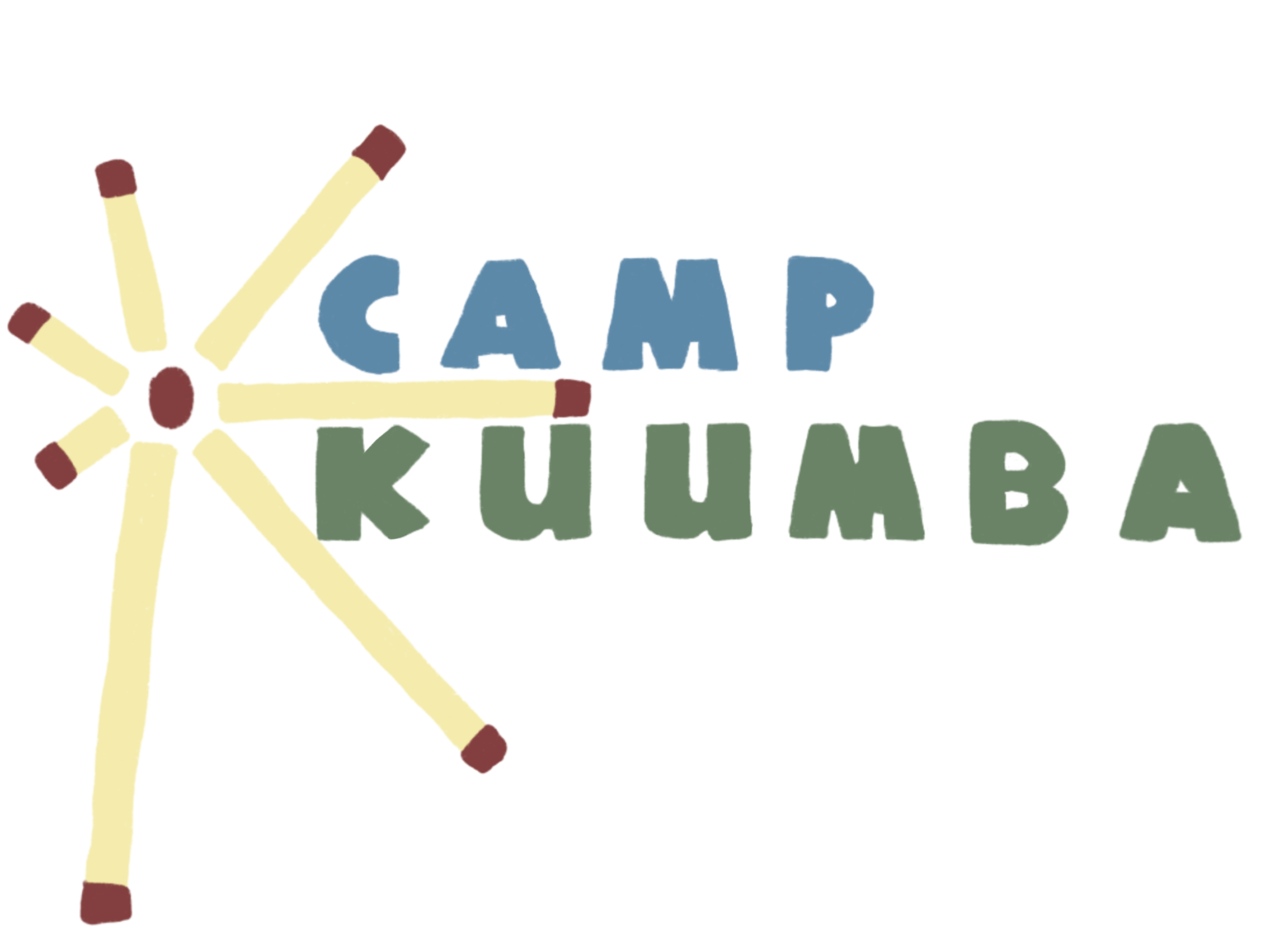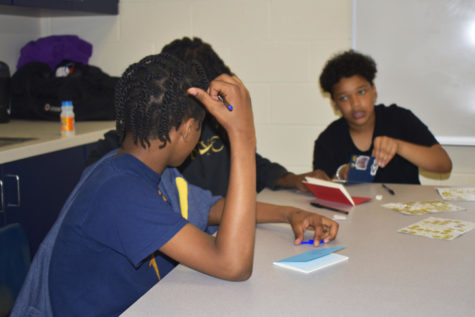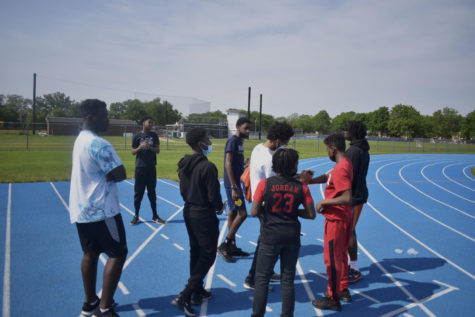Your donation will support the student journalists of the Evanstonian. We are planning a big trip to the Journalism Educators Association conference in Nashville in November 2025, and any support will go towards making that trip a reality. Contributions will appear as a charge from SNOSite. Donations are NOT tax-deductible.
Camp Kuumba: the launching point to success
Since its inception, the mentorship program has intended to bridge the opportunity gap for Black youth
April 20, 2023
On Sunday, June 2, 2019, Ryan Allen Bost walked across the stage at the Welsh-Ryan Arena to receive his diploma from Evanston Township High School. A star of the ETHS basketball team, Bost tallied over 100 victories during his four-year career, not only winning games, but the hearts of the ETHS community.
A year and a half later, on Nov. 9, 2020, while sitting in the backseat of a parked car in Rogers Park, Bost was shot and killed.
For Douglas Wood, current ETHS senior and friend of Bost, this tragic death was yet another loss for him to grapple with, but at the same time, something he had grown accustomed to experiencing.
“Growing up, I never had a year in my life since I was a toddler where someone I knew didn’t die from gun violence,” says Wood. “So you grow a strong tolerance to that, but it still affects you. It’s always going to affect you.”
Evanston has a long history with gun violence- from recent events such as the shooting at Clark Street Beach to the killing of Haven student Wayne Hoffman in 1997. In the late 1990’s, two ETHS students and one graduate were killed, all on separate occasions relating to gang violence.
Following the beginning of the COVID-19 pandemic, it was recorded that Black children had an increased chance of being affected by gun violence, a probability that was already much higher than white kids.
Beyond this increased risk of exposure to violence, Black youth are forced to cope with the systemic opportunity gap presented within academic and professional environments. Between these two challenges, Black youth are more likely to struggle finding support throughout adolescence.
Chris Livatino, the head athletic director at ETHS, was left feeling devastated by another community loss after Bost’s death, while also frustrated with the clear opportunity gap Evanston poses for young Black men.
It was through Livatino’s frustration that the idea of Camp Kuumba began, with a group of ETHS coaches and teachers meeting over Zoom every Monday afternoon during the spring of 2021, brainstorming ideas in which some sort of program could be created to support Evanston’s Black youth.
“The whole program started out of the tragic death of Ryan Bost. And that summer, we had a few other young men that were shot and killed,” says Livatino. “This was a really low point for me personally, thinking about the loss of Ryan and just realizing that this is another young Black man who had been shot and killed.”
Through weeks of what Livatino describes as “think tanks” over Zoom, the team of coaches and teachers had come up with an idea that would change the way Evanston serves its Black community: Camp Kuumba.
The word ‘Kuumba’ comes from the sixth principle of Kwanzaa, and means, “To do always as much as we can, in the way we can, in order to leave our community more beautiful and beneficial than we inherited it,” a mission that guides the philosophy and structure of the program.
The initial vision for the camp was to provide Black boys in Evanston with opportunities that would allow them to explore things that were often inaccessible to them due to racial and social inequities within Evanston. These opportunities were not limited to sports but ranged from STEM projects to financial literacy, providing the campers with exposure to important life skills as well as academic and athletic fields in which they may not have experience.
A day in camp could involve any of these activities, including art projects, science experiments, and time outside on the ETHS track.
As the vision for the camp grew, so did the team of people involved. Today, Camp Kuumba has evolved into Kuumba Evanston is supported by a large team of people, including administrators, teachers, coaches and student mentors, now functioning as a year-round program.
To attend Camp Kuumba or other Kuumba programming, children and their families do not have to pay for any tuition related expenses and are able to access every aspect of the program for free. Kuumba Evanston is entirely funded by donations, as well as volunteer work from many staff members.
“We’re impacting families, children and individuals in the community. We’re giving them access to things and opportunities that they usually are left out of or can’t afford,” says Marx Succes, ETHS PE Teacher and former Camp director.
Beyond young Black men, the program is expanding to Black girls within Evanston this summer.
“[Camp Kuumba] all centered around Ryan’s death and the homicides and shootings of other Black males in our community. So we wanted to focus on Black boys first, but we’ve always had the definite intention of expanding this to Black females and the Latinx community as well. This summer, we’re adding a girls program,” says Livatino.
Leading the expansion to girls programming is ETHS girls basketball coach Brittany Johnson, who grew up on Chicago’s West Side.
“Growing up, I was able to do a lot of things that my friends and the people that lived in my community couldn’t do, because I was very good at basketball,” she shares. “Basketball really opened a lot of doors for me, [so] it’s my goal to find that thing that opens the door for every kid that we work with.”
The camp offers a wide range of sports for exploration, including basketball, soccer, swimming and lacrosse, a sport primarily dominated by white students. ETHS teacher and water polo coach Andy Miner directs the aquatic program at camp and has observed the immense growth students experience when gaining confidence athletically and in the water.
Each kid involved with camp has varying levels of experience with swimming, with some students first experiencing being in water during their time at camp. Miner maintains a Kuumba swim program throughout the year, allowing students to continue improving their swimming abilities, while also building trust and community.
“The goal of the program is to do exactly what it’s doing,” says Miner. “[The program] exposes kids to something new and validates them in the space and lets them grow into their identity of how they interact in a pool in a water space on their own terms.”
Although much of the Kuumba staff are ETHS coaches and have strong athletic backgrounds, the program aims to go beyond sports.
“We have that background,” says Johnson. “That’s always going to be a part of what we do, but we’re also about developing the whole person. We want the kids to have different experiences, providing them with mentors and older people in the community who [can] help guide them, give them advice, and just be there for them.”
One of these experiences is explorations within the STEM field, with programming led by lifelong Evanston resident and now ETHS teacher Gerald Daye, who grew up attending Evanston camps and has a deep understanding of what the community offers—and what it doesn’t. Daye develops each and every STEM program at camp, with projects such as Rube Goldberg machines and science labs, which challenge campers to work together and build something.
“We [made] bottle rockets, a marble run challenge and catapults,” Daye says. “It’s about challenging the kids and helping them find their general real genuine interests and strengths.”
By offering STEM programming at Kuumba, campers are exposed to classroom-like experiences that they may not have in a normal academic setting, which allows them to build community and trust not only within others, but within themselves.
Greg Taylor, the current director of Camp Kuumba, emphasizes the importance of opportunity in young people’s lives.
“The opportunities that we’re trying to create are giving kids the power to say, ‘I can explore any interest I have. If I have something I’m passionate about, then I should go learn more about it,’” Taylor says.
Taylor and Kuumba Evanston aim to challenge participants in a safe environment, expanding their academic, social and recreational horizons.
“That’s kind of what camp is getting kids to [do] on a daily basis,” Taylor says. “[It may] not be [considered] normal or easy, but [it] challenges them to do things that may be difficult, in terms of how they relate to each other, how they accept each other and how they push each other.”
Part of challenging the youth involved is taking them on off-campus outings, which has included trips to the Shorefront Legacy Center and other Chicago-area museums, exposing kids to learning experiences that they were unaware existed before attending camp. Most recently, a group of kids went to iFLY, an indoor skydiving simulation, which combined STEM concepts learned in Daye’s programming with an exciting recreational activity. Almost all of the participants said it was their first time experiencing anything like it, a common statement expressed by youth within the depth of opportunities offered at Kuumba Evanston.
One of the highlights of the camp is its financial literacy program, developed by ETHS math teacher Dawn Eddy. Throughout the camp, participants have the opportunity to earn ‘Kuumba Cash,’ a reward system used for positive leadership and behavior. They then have chances to save, spend or invest their cash, teaching kids the basics of budgeting and financial literacy, something many of them are exposed to for the first time at camp. As a Black woman, Eddy highlights the fact that Black people, especially youth, are often never taught how to manage their money, further widening the opportunity gap.
“We wanted to get them started on their wealth journey as well, because so many Black people don’t really understand or don’t get access to investing,” Eddy explains. “There’s an information gap a lot of [the] time and we want to make sure that the kids that are in Kuumba can actually get exposed to it, get practice with it, and then get their wealth journey going.”
By engaging students in positive examples of financial responsibility, athletics, and STEM work, kids involved with camp are able to see their own potential, ability, and individuality, things that are not often prioritized in mainstream culture, especially for young Black people.
“Culturally, there’s not a high value placed on just being an individual, following your own passions,” Taylor says. “In Black culture, there’s a lot of negativity on TV screens and in music.”
A large part of providing positive role models is the inclusion of guest speakers throughout the program. In the past, speakers have included Dr. Marcus Campbell, ETHS superintendent, and historian Dino Robinson.
“One of the most impactful parts of the program is when we bring in speakers and young, African American, male or female, are able to see successful people that look like them,” says Succes.“People that came out of the same situations and came from the same districts, the same family, same community. And we’re not talking about bringing in individuals that were always straight A’s or AP students, some struggled and had to make the right decisions where we have some students that still have (the opportunity) to make the right decisions.”
Beyond the guest speakers, Kuumba creates a community within the camp, forming strong bonds between students and mentors. For Daye, this work has served as his life’s purpose, forming meaning far beyond the hot summer afternoons in which camp takes place.
“I’m grateful to know that this is what I feel like I’m meant to do,” he says. “To lead Black youth, to be an older brother, to be a mentor for them. This is why I feel like I was put on this earth to do and be gifted to do, so I’m grateful every day that I get to do that.”
Mentors such as Daye provide Black youth in Evanston a support system that grows with them throughout their time in Evanston, which Coach Johnson views as one of the most important roles of the program.
We try to provide them also with just a network of people who they can always count on, who will always be there for them, no matter what,” she says. “It’s our hope that we start recruiting and have them come into our programming in third grade. So by the time they are in ninth grade, we would have provided them with so many opportunities to discover who they are and what they love, that by the time they get to high school, they’ll be in a place where they can really succeed.”
As a student mentor, Wood often sees kids from camp while working his shift at the Dollar Tree or while playing basketball in the park. He is graduating this spring and has consistently offered students support with whatever they may need, both inside and outside Kuumba programming.
“We stay with these kids,” says Wood. “The more funding we get, the more we put into kids, because all we’re trying to do is just build connections and stay in their lives. Some of these kids don’t have father figures. So that male role model just means all that much more. Because you’re building a good relationship with that kid. They might need you someday.”
For Succes, the impact on students and their families is the most clear at the end of each camp session, where everyone involved is able to look back on the growth experienced over such a short period of time.
“To see parents and campers sad that it’s over, or even some even in tears. And then to hear from the campers, what they got out of it for the six weeks,” he says. Yes, some that were somewhat apprehensive at the beginning and didn’t know what it was going to be all about. But they’ve developed relationships, and now they trust us and can’t wait to come back and ask for camp to be all summer long instead of three weeks or six weeks. That’s just priceless. It’s been life changing, not just for the campers, but as well as for us as counselors and workers.”
From the very beginning, Camp Kuumba was inspired by the need for change, the need for community.
“This all started in response to a group of people who, after the death of Ryan Bost, wanted to try to talk about that narrative and what was going on in the community, but just wanted to do something about it,” says Johnson. “So Kuumba Evanston is all about trying to do something.”




